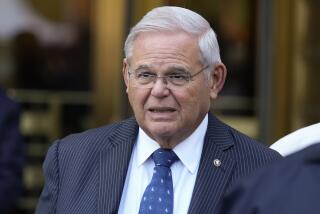Stevens’ ‘gifts’
- Share via
Of all the testimony offered during the four-week corruption trial of Sen. Ted Stevens (R-Alaska), perhaps the most revealing came from Stevens himself when he took the stand in his own defense Monday. Justice Department attorney Brenda Morris was grilling him about a costly massage chair that had been in Stevens’ Washington home for seven years, a chair given to him by a friend but never listed as a gift on the senator’s financial disclosure forms.
“He bought that chair as a gift, but I refused it as a gift,” Stevens said. “He put it there and said it was my chair. I told him I would not accept it as a gift. We have lots of things in our house that don’t belong to us.”
That is a statement one might expect from a former federal prosecutor, a man intimately versed in the letter of the law, but it also shows Stevens to be clueless about the ethical standards the law is meant to enforce. His philosophy goes something like this: As long as he covers his posterior by telling donors that he won’t accept their gifts, he can go ahead and keep them without informing taxpayers that he’s beholden to anyone. The heart of Stevens’ defense on seven felony counts of allegedly failing to disclose gifts worth more than $250,000 is that people just do things for him, and although he’s one of the most powerful figures in the U.S. Senate, there’s nothing he can do to stop them. And if he sometimes does political favors for his donors in return, that’s purely coincidental.
The jury in Stevens’ trial will begin its deliberations today, and the outcome is by no means certain. Though the prosecution presented voluminous e-mails and secretly recorded conversations, mostly between Stevens and his prime donor, oil-services mogul Bill J. Allen, there is no clear admission of guilt on the record. What’s more, repeated blunders by the prosecution came close to producing a mistrial.
Stevens doesn’t seem too concerned about the outcome. In one of those recorded conversations with Allen, he pointed out that there was little the Justice Department could do to hurt them. “They’re not going to shoot us, it’s not Iraq,” he said. “Worst can be that -- worst that can happen to us is we run up a bunch of legal fees and might lose, and we might have to pay a fine, might have to serve a little time in jail.”
Ever the lawyer, Stevens is right about the legal consequences. But he’s wrong overall. This is one of those cases in which the verdict of the court of public opinion matters a good deal more than the verdict of the jury -- Stevens is in a tight race to retain his Senate seat against Anchorage Mayor Mark Begich, and this trial could cost him his job. Even if the jury finds that his actions weren’t technically illegal, Alaska voters have been presented with a detailed look at how he does business, and it stinks from here to Nome.
More to Read
A cure for the common opinion
Get thought-provoking perspectives with our weekly newsletter.
You may occasionally receive promotional content from the Los Angeles Times.










